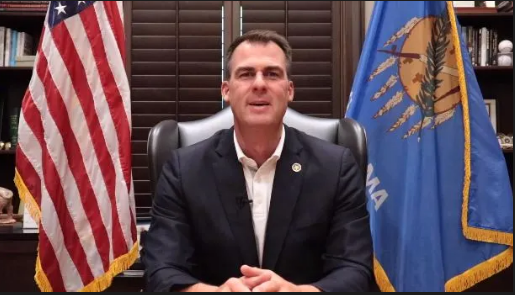
Oklahoma Gov. Kevin Stitt, who was recently elected to a second term on a platform of expanding education choice, came out in “strong disagreement” against the state Attorney General Gentner Drummond’s withdrawal of a legal opinion issued by his predecessor supporting the approval of a Catholic virtual charter school.
Stitt released a letter to Drummond Monday evening, four days after his newly elected fellow Republican withdrew an advisory opinion written by the outgoing John O’Connor. The opinion, which was O’Connor’s last official act, said the state’s ban on publicly funded charter schools operated by sectarian and religious groups could violate the U.S. Constitution’s First Amendment and should not be enforced.
“You contend that the United States and the Oklahoma Constitutions permit, and indeed require, the state to discriminate against religious organizations seeking authorization to operate charter schools,” Stitt’s letter said. “In fact, the opposite is true.”
The letter continued, “These prohibitions run afoul of the non-discrimination principle articulated by the U.S. Supreme Court in recent cases.”
O’Connor’s opinion came as a statewide virtual charter school authorizing board was set to decide on an application for St. Isidore of Seville Catholic Virtual School, which the Catholic church seeks to open to serve students in rural areas without a traditional Catholic school and to expand course offerings for students who already attend Catholic schools.
The proposed school is named for the saint that Pope John Paul II in 1997 declared the “patron saint of the internet.”
In withdrawing his predecessor’s opinion, Drummond stated that request for the opinion should have come from the statewide authorizer’s governing board rather than the executive director. He also argued that the opinion was based on precedent for private schools and that state law defines, and the attorney general has previously recognized, charter schools as public schools.
Drummond also said allowing the state to sponsor a religious school would create “a slippery slope” to use “religious liberty” to justify state-funded religion.
The Oklahoma board’s vote, which could come as early as this month, is expected to spark litigation regardless of the decision. If approved, St. Isadore of Seville Catholic Virtual School would be the nation’s first religious charter school.
Oklahoma City Archbishop Paul Coakley and Tulsa Bishop David Konderla issued a statement praising Stitt for affirming “a correct and well-reasoned understanding of religious freedom in Oklahoma. As the U.S. Supreme Court has opined in numerous recent decisions, public funds cannot be denied to religious institutions simply because they are religious.”
The statement noted that privately-run religious schools in Oklahoma have benefited from public funding in the form of scholarships, tax credits and other modes for many years, and that these programs have allowed “countless students in our state to receive the education their parents determine is best for them.”
The U.S. Supreme Court ultimately could decide the issue before any Oklahoma lawsuits reach the courts if the justices choose to consider a U.S. Fourth Circuit Court of Appeals ruling against a conservative charter school in North Carolina that required girls to wear skirts.
A group of parents who sued argued that the public school’s policy violated their daughters’ constitutional rights. In its defense, Charter Day School argued that charter schools were not “state actors” but essentially private schools, with only broad state oversight.
In its ruling for the plaintiffs, the appellate court, however, called charter schools public schools and therefore subject to state and federal anti-discrimination laws.
The high court has asked the solicitor general, the Biden administration’s top Supreme Court lawyer, for guidance before deciding whether to consider the case.


